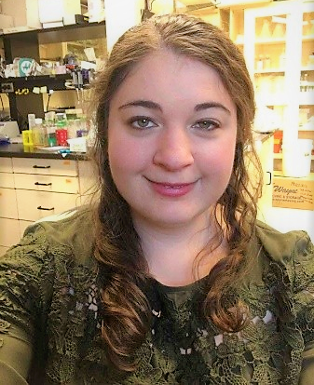Sara Blazejewski '16, Ph.D.

My career in science began in the neuroscience program at the University of Scranton. The lab rotations during my freshmen year provided exposure to research being done by faculty. I joined the Waldeck lab and was actively involved in research throughout my undergraduate degree. The Research Methods course was very useful in learning about experimental design.
The University also had several student-led organizations and clubs that helped me learn about external research opportunities. Using these resources, I was able to secure two summer undergraduate research internships at Penn State Hershey College of Medicine and Thomas Jefferson University during the summer after sophomore and junior years, respectively.
Discovered a Passion for Research
In my senior year, I completed my Honors Project with mentorship of Dr. Waldeck, which was an excellent opportunity to complete an independent research project. All these experiences were critical in my decision to pursue a PhD in neuroscience and a career in research. I started college hoping to go to medical school afterwards. Then I discovered there were many other career options in science that might better suit me and my passion for research.
After graduating from the University of Scranton, I enrolled in the neuroscience doctoral program at Drexel University. I felt well-prepared for my graduate coursework, thanks to the strong scientific foundational knowledge acquired at the University of Scranton. My doctoral thesis focused on cellular and molecular mechanisms during cortical development, and I was specifically interested in neuronal morphogenesis since proper morphology is necessary for a neuron’s function. I graduated in April 2021.
Research and Development Job in Private Industry
I transitioned from my doctoral work to an industry role in research & development at GSK. I am learning how to apply my expertise in developmental neurobiology to my new role as a developmental and reproductive toxicologist. This may seem like a bit of a jump, seeing as all my training is in neuroscience, but during a PhD, you learn many ‘soft skills’ such as problem solving, the ability to read and interpret scientific literature, etc. so you do not necessarily have to stay in the same field after you graduate, especially if your plan is to go into industry.
My role is to monitor studies that support clinical trials. Before women of childbearing potential can be enrolled in a clinical trial, the risk to embryo-fetal development must be assessed by toxicology studies. Fertility and post-natal development are also assessed. Additionally, I am involved in whole embryo culture studies, which act as a screening tool to identify potential hazards at early stages of drug development.
The Benefits of A Scranton Education
My experience at Scranton set the tone for the next stages of my career. It set a good example of the type of environment I work well in, which is collaborative as opposed to competitive, and I sought similar work environments and cultures for my next steps. I was encouraged to participate in science outreach activities at Scranton, which is something that I found rewarding and have continued with to this day. The University has a great community, and I made many valuable connections during my time as an undergraduate and as an alumna. I am very glad that my career path started at the University of Scranton.





